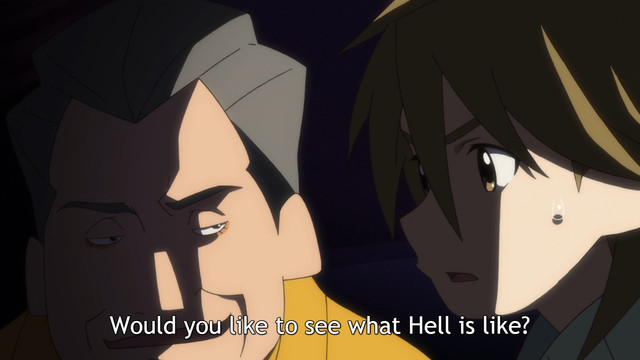I have to admit, I have a bit of a soft spot for The Eccentric Family’s Soun Ebisugawa.
That affection is a little hard to justify. After all, Soun is not a particularly nice man. When Soun felt jealous about his brother’s success in building a family and governing the Kyoto tanuki, he didn’t confront him about it - he orchestrated the assassination of his own brother, setting all of the events of the first season into motion. When it still seemed like his brother’s son Yaichiro might inherit his father’s position, he attempted to kill his nephew, and imprisoned the majority of his relatives in the process. When confronted regarding his misdeeds, he showed no sign of remorse - and even after being banished from Kyoto altogether, he’s reemerged full of nefarious ideas, now gunning to join the tanuki-eating Friday Club.

So yes, Soun has a few minor crimes to answer for. But one of the things I actually, specifically love about him is that he’s so friggin’ unrepentant. The Eccentric Family does not try to make Soun Ebisugawa a sympathetic figure. I wouldn’t consider that a failing of the writing - some people are just not that sympathetic, and though complex antagonists tend to make stories richer as a general rule, that doesn’t mean there isn’t space for cackling villains as well. Though Soun certainly pities himself, pity is the last thing he’d want from anyone else. He is determined to prove his own worth, however vile his methods must be.
Soun’s most recent appearance leans into his ineffable, almost supernatural nature. As Yasaburo tracks the Friday Club into a run-down Kobe establishment, he finds himself before a strange, shadowed room. The emphasis on the threshold here implies he is crossing some key gateway into a different kind of world, a technique the show regularly uses before introducing one of its more fanciful ideas. Just as Yasaburo and his brother once crossed the threshold into Benten’s geographically impossible lake or Nidaime’s unbelievable rooftop estate, so too has Soun now grasped the power of the tengu, the power to make of his world what he wishes.

Soun initially disguises himself as his brother Soichiro, Yasaburo’s father. On an immediate level, it’s easy to see this as both a way to convey his intentions and a way to provoke Yasaburo. Soun has always coveted his brother’s position, and now he thinks he can finally paint over his sibling’s legacy. Filling a cup with sake and offering it to Yasaburo, he appears like some servant of the underworld, biding Yasaburo to join him on the other side.
The lighting and framing of this scene heavily bolster its sense of mythic import. Yasaburo is presented as stranded between the light of the exit and the light of Soun’s candle, underlining the idea that Soun is asking him to cross some mythic passage. The inconstant candle presents Soun as perpetually defined by shadow, wavering between forms and occasionally disappearing entirely. And the overhanging darkness conceals this room’s true threat, a painted portal to hell. The moment Soun’s candle gutters out, his spell of passage is broken, and Yasaburo is torn from the upper world entirely.

All that is to say that The Eccentric Family is very good at portraying Soun as a villain’s villain - he has a constant sense of menace and presence that really sells the threat he represents. I can appreciate a show that really leans into its characters in this way, presenting them as larger than themselves, or the versions of themselves they’d want to affect. But though Soun would never admit it, the last reason I like his character is that in truth, he’s not so ineffable after all.
Soun’s crimes are certainly heinous and likely unforgivable ones, and Soun himself has no interest in being forgiven. But through the course of The Eccentric Family, it becomes clear that he’s as lost as anyone, railing against societal values that he doesn’t understand and which have never helped him. The show’s emphasis on the power and value of family likely tastes like ash in his mouth - after all, Soun feels like he was abandoned by his “true” family, and sold off to the Ebisugawas as a political gesture. Like Benten, he’s driven by a sense of permanent displacement, a feeling that his lack of a true home is a wrong that must somehow be righted.

Soun’s experience with the show’s concept of a “life well-lived” and “the nature of a tanuki” are equally poisoned. The Eccentric Family’s first opening song urged its viewers to enjoy everything, beaming with slogans like “be interesting!” and “wonderful daily life!” That’s what tanukis do, after all - they’re tricksters, but they’re here to have fun. Yasaburo’s father Soichiro embodied this philosophy, and Yasaburo is clearly following in his father’s footsteps, but Soun has never been able to view life as a cooperative, joyful experience. He looks at his brother and sees all the markers of material success - a happy family life, a prestigious name, great respect within tanuki society. To someone obsessed with finding traditional success, the theoretical “nature of a tanuki” would be baffling, even infuriating - and so it’s little surprise that by season two, Soun has settled on abandoning “tanuki nature” altogether.
Of course, none of that justifies Soun Ebisugawa’s cruelty and violence. But hey, he’s a villain - as I said, if he were a totally sympathetic character, he wouldn’t be the same person. I’m okay with Soun being an unrepentant monster, and I don’t mind if never changes his ways. Even the occasional villain is all part of our interesting daily life.
-----
Nick Creamer has been writing about cartoons for too many years now, and is always ready to cry about Madoka. You can find more of his work at his blog Wrong Every Time, or follow him on Twitter.
No comments:
Post a Comment